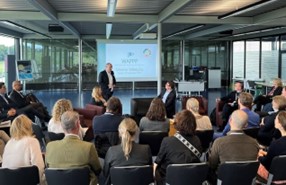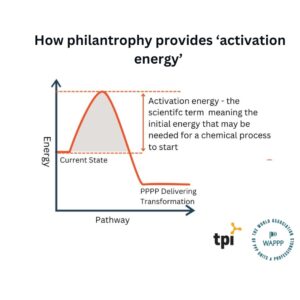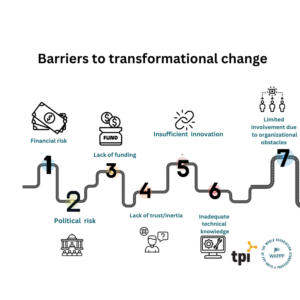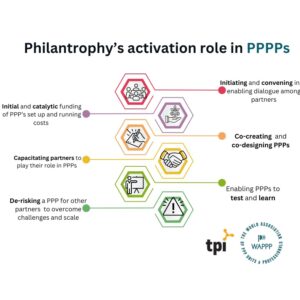At the #ConnectToChange conference of Swiss Foundations on September 12, 2024 in Sursee, Switzerland, more than 60 foundations gathered for the first-ever fishbowl conversation about public-private-philanthropy partnerships – PPPPs.
So what is so special about PPPPs? This kind of partnership approach can have a systemic impact at a large scale. By leveraging partnerships, they aim for deep transformational changes in society, addressing critical challenges such as climate change, social injustice, polarization, and other pressing issues facing humanity today.
Consider nationwide energy transition projects like the ‘Just Energy Transition Project’ in South Africa, social housing projects like ‘Ciudad Bicentinario’ in Columbia, or introduction of new education infrastructure and curricula through ‘CLEF in Côte d’Ivoire’. These initiatives, realized through PPPPs, drive systemic change, with philanthropy playing a unique, catalytic role in their success.
In 2023, The Partnering Initiative (TPI) analyzed 46 PPPPs to unlock the catalytic potential of philanthropic foundations in PPPPs and other Multi Stakeholder Partnerships. Supported by Laudes Foundation and African Climate Foundation, TPI and WAPPP published and continuously updated the PPPPs Library at COP28, along with the eye-opening report ‘Systems change activation: Philanthropy’s catalytic role in transformational PPPPs’.

During the fishbowl conversation in Sursee, Canton of Lucerne, foundation representatives emphasized the need for more effective PPPPs to tackle systemic issues with a long-term approach. By combining the expertise, networks and diverse funding from public, private and philanthropic sector partners, PPPPs can help reduce risks for all involved. This collaboration makes projects more viable, ultimately attracting new partners and encouraging broader participation.

However, people also noted that the complexity of thematic areas, such as climate adaptation or social justice, as well as the nature of PPPPs, can create roadblocks that need to be overcome. TPI’s research suggests that foundations provide ‘activation energy’ to these projects—similar to the energy required to initiate a chemical reaction.
This support helps overcome challenges such as financial and political risks, lack of leadership and lack of trust, insufficient innovation and gaps in technical knowledge, among others.
The discussion highlighted the importance of partners from different sectors getting to know each other, building trust and setting realistic expectations about what each can and cannot contribute. Often, this requires partners to step out of their comfort zones and embrace innovation and flexibility.
In this context, the research identified six key ways in which philanthropy can provide the necessary activation energy:
- Initiating and convening partners, guiding them through a partnership development process, and potentially coordinating the partnership’s activities. Philanthropy adds credibility and facilitates dialogue among partners.
- Co-creating and co-designing PPPPs with public and private partners and where appropriate with peer organisations. Philanthropy provides a steady flow of energy and momentum.
- Providing initial and catalytic funding for the set up and running costs of a PPPP (excluding the cost of implementing the transformation).
- Strengthening the capacity of partners to fulfill their roles in the PPPP and accelerate progress with technical assistance. Philanthropy often contributes technical expertise, helping partners adopt new models and ways of working.
- De-risking PPPPs for other partners, enabling them to address the most difficult challenges and scale up by attracting mainstream private sector investors.
- Enabling PPPPs to test and learn through multiple iterations of a solution by prototyping innovative approaches.
A recurring theme in the fishbowl conversation was the call for innovation in partnership approaches. Key requests included access to capacity building, opportunities for peer exchange, matchmaking initiatives and most importantly, encouraging all three Ps to be courageous in piloting and testing new approaches.
All these measures will help mainstream transformational PPPPs, but only if we build proactive alliances across the public, private and philanthropy sectors. This involves collaboration with organizations such as TPI, WAPPP, the global philanthropy network WINGS and its regional counterparts, as well as UN agencies such as UNIDO, UNFCCC, UNHCR, along with the private sector.
TPI, WAPPP and WINGS are committed to turning these ideas into action. Additional partners are in the process of joining the new PPPP alliance.
Authors:
Jean-Christophe Barth-Coullaré, Executive Director, WAPPP
Max von Abendroth, Lead Public-Private-Philanthropy Collaboration, The Partnering Initiative (TPI) & Chair of the Philanthropy in PPPs Chapter, WAPPP



